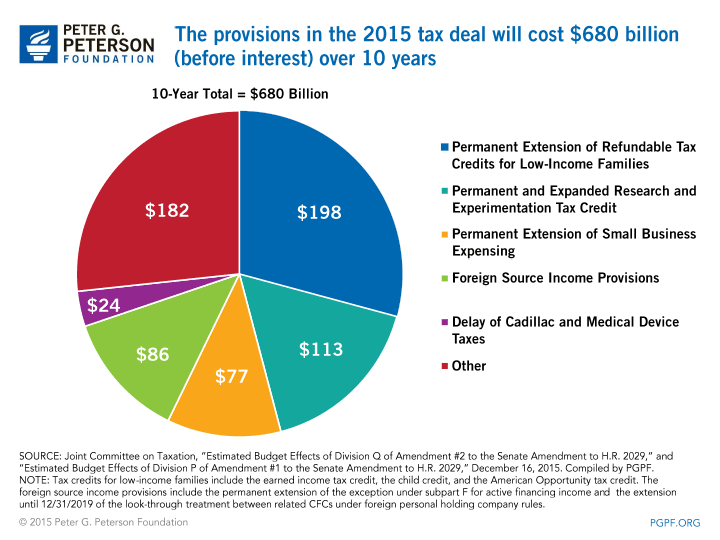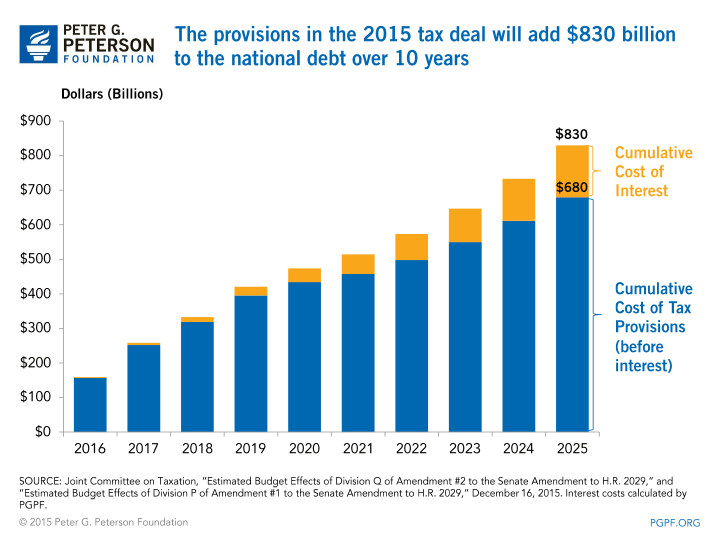You are here
Congress Passes Costly and Unfunded Tax Legislation
Today, Congress passed costly and unfunded legislation to extend a number of expired and expiring provisions of the tax code. The measures are contained in the omnibus appropriations bill now awaiting the president’s signature, and cover an array of tax provisions, from tax credits for research and experimentation and low-income families, to special deductions for race horses, NASCAR tracks, and nut growers.
The legislation is fiscally irresponsible and will add significantly to our national debt. If signed by the President, it would add approximately $830 billion to the national debt over the next 10 years, and an estimated $2 trillion over the next 20 years1. This is because the costs are not offset by reductions in spending or increases in other revenue, and are therefore financed entirely through higher deficits. Furthermore, the legislation is not part of any strategic and comprehensive approach to tax reform, so they maintain the tax code’s complexity and inequity by providing subsidies to some people, activities, and industries, and not others.
One provision delays (from 2018 until 2020) the implementation of the so-called "Cadillac tax" on expensive employer-provided health insurance plans — this not only reduces revenue, but it also undermines efforts to control healthcare costs. The Cadillac tax creates incentives that limit the growth of high health insurance premiums. High premiums contribute to rising healthcare costs and also have a negative impact on wage growth. Slowing the rate of growth of healthcare costs is one of the most important factors in stabilizing our national debt over the long term.
Our nation faces serious long-term fiscal challenges driven by an aging population, rising healthcare costs, and an inadequate tax system. Our children face a future of staggering deficits and unthinkable debts that will damage our economy. This last minute, year-end policymaking will add significantly to our nation’s long-term debt — threatening to crowd out resources that will be needed to fund investments in our future. Ultimately, the legislation represents yet another missed opportunity to thoughtfully and comprehensively reform our broken tax code.
What’s in the legislation?
The combined tax package extends a number of expired or expiring tax breaks for businesses and households. Some tax provisions are extended permanently, others are extended until 2020, and some are extended only until the end of 2016. The main provisions are:
- Permanent extension of an enhanced tax credit for research
- Permanent extension of Section 179 expensing, which allows small businesses to write off 100% of their capital investments when put in place
- Permanent extension of the refundable tax credits for low-income families, including the Earned Income Tax Credit, the Child Tax Credit, and the American Opportunity Tax Credit (used for college costs)
- Delay until 2020 of the Cadillac tax on expensive employer-provided health insurance plans and the medical device excise tax
- Extension of provisions that reduce taxes on certain foreign-source income
- Extension of a wide range of other provisions including faster depreciation for first-year capital investments, tax credits for solar and wind, and tax breaks for race horses, NASCAR tracks, and Puerto Rican rum
Most of the provisions expired on December 31, 2014, but the legislation reinstates them retroactively so taxpayers would be able to claim them on their 2015 returns. According to the Joint Tax Committee, the tax provisions will cost $680 billion over 10 years, before accounting for interest on the additional debt required. Because the tax provisions are deficit financed, they will increase the amount of interest that the federal government will have to pay on the debt. According to calculations prepared by the Peter G. Peterson Foundation, the legislation will increase interest costs by $150 billion over 10 years. As a result, the legislation will increase deficits by approximately $830 billion over 10 years. The low-income tax credits account for 29 percent of the cost, while the research tax credits, small business expensing, and provisions for foreign source income account for 41 percent. The remaining provisions account for 30 percent.

In August 2015, the Congressional Budget Office projected that 10-year deficits would total $7 trillion under current law. The tax legislation if enacted would increase the current-law deficit to $7.83 trillion over 10 years — a significant increase of 12 percent.

Conclusion
The United States faces serious long-term fiscal challenges. Over the next 25 years, federal debt is projected to climb to 100 percent of GDP under current law and to soar to a staggering 175 percent of GDP under less optimistic assumptions. Those deficits and interest costs will harm the economy, crowd out private investment, and reduce the resources available for public investments.
Enactment of the tax provisions would substantially increase the long-term fiscal challenges facing the nation, and misses an opportunity to reform our tax system. This legislation is a big step in the wrong direction in addressing our nation’s fiscal and economic health.
1CRFB, "Committee for a Responsible Federal Budget Opposes Fiscally Irresponsible Tax Deal" (December 16, 2015) at http://crfb.org/document/committee-responsible-federal-budget-opposes-fiscally-irresponsible-tax-deal (Back to citation)
